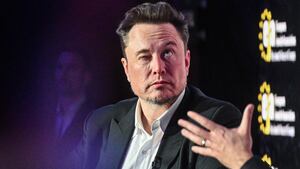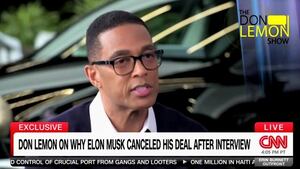Elon Musk claimed in his much-awaited Don Lemon interview that Donald Trump didn’t ask him for money during their meeting earlier this month and that even if he had, he had no plans on weighing in on the 2024 presidential election—for now.
“I don't want to put a thumb on the scale monetarily that is, you know, significant.,” Musk told Lemon in an hourlong interview published on Monday. The meeting, he claimed, happened after Trump stopped at a breakfast Musk had with a friend and didn’t include anything Trump has not already said publicly.
Musk said he had no current plans to endorse a candidate in the race, though that could change in the final weeks before November. However, he did acknowledge he was “leaning away” from President Joe Biden.
The X owner’s disclosure of his Trump meeting was one of the few bits of news to emerge from the contentious interview, one that was propelled into national discourse after X cut ties with the ex-CNN star last week following the interview’s taping. Lemon’s questions often made the erratic billionaire visibly uncomfortable, particularly when Musk was pressed on his view on content moderation and diversity, equity, and inclusion programs.
After a mostly cordial start that covered Musk’s various companies and future projects—including his plans for X, Tesla, and SpaceX—the conversation veered off track when Lemon asked about Musk’s drug usage, including his admitted ketamine prescription.
“It's pretty private to ask somebody about a medical prescription, you know,” Musk said.
He defended his usage of the drug as an occasional dosage to rectify a “negative chemical state,” but he touted the drug’s benefit over SSRIs as a remedy for depression. Doctors have repeatedly suggested that patients opt for the drug only if they cannot get relief from other forms of anti-depression treatments.
Lemon then abruptly pivoted to the Great Replacement Theory, a conspiracy propagated by right-wing extremists that claims Democrats want to “replace” the U.S.’ white population with migrants, often from south and central America, in an attempt to somehow boost their vote totals. He repeated the frequent right-wing refrain that Democrats have an “incentive” to systematically allow undocumented immigrants to flock to liberal states in order to affect the state’s apportionment of both House seats and electoral college votes.
Lemon pushed back on the claim, arguing that the Electoral College’s system is designed to favor less populated states that often veer conservative.
The ex-CNN host also noted the theory’s roots in neo-Nazi communities and its manifestation in the motives of various mass shooters. He asked Musk if increased content moderation on X could help curb the dissemination of such ideas—and, therefore, how often Musk is questioned about them.
“I don’t have to answer questions from the reporters. Don, the only reason I'm doing this interview is because you're on the X platform and you asked for it,” Musk shot back. “Otherwise, I would not do this interview.”
Even the nature of content moderation seemed to irk the billionaire, who praised the platform’s Community Notes feature and argued that the only content he felt should be removed from the platform was anything illegal.
“The shooters in all of these mass shootings attributed social media to radicalizing them,” Lemon started.
“So Don, you love censorship is what you’re saying?” Musk said.
When Lemon defended his belief that he believed in appropriate content moderation, Musk seemed to care less about the journalist’s sentiment. “Moderation is a propaganda word for censorship,” he said.
It’s a claim Musk tried to stick to after X canceled its partnership with Lemon last week, calling Lemon’s show in an X post “CNN, but on social media” and alleging the show was just former CNN chief Jeff Zucker talking through Lemon.
“All this said, Lemon/Zucker are of course welcome to build their viewership on this platform along with everyone else,” Musk added.
The rest of the interview touched on various other cultural and legal touchpoints, including a pending racial harassment claim against Tesla, the reality of DEI programs, and Musk’s views on trans rights. “You posted, ‘pronouns in bio mean the woke mind virus ate your brain,’” Lemon said. “Do you know what the term woke actually means?”
Musk then tried to claim the word indicated people who tried to “blame everything” on race and gender issues were “divisive and corrosive to society”—despite the word’s original connotation, which was used to describe a person who had become aware of societal inequities.
It eventually became clear that the interview truly irked Musk, prompting Lemon to question why he seemed so bothered—a question the billionaire refused to answer, though he criticized the way Lemon phrased his questions as “not cogent.”
“One or two questions I can do and then we'll have to call it,” Musk later said.
As Lemon wrapped up the interview, he alluded to the tension throughout and the controversy it later spurred: “Let me tell you something about this show: The conversation doesn't end just because the camera stops.”







